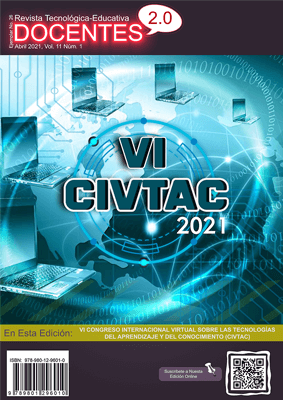Training for Peace and Coexistence: Mediation and the Transformation of School Conflicts
 DOI:
https://doi.org/10.37843/rted.v11i1.198
DOI:
https://doi.org/10.37843/rted.v11i1.198
Main Article Content
Abstract
The concepts of peace, coexistence, conflict have taken on in some social settings, including the educational one, an indiscriminate use, disuse, and implementation. For this reason, the research work conciliation tables were a proposal for the formation of peace and coexistence, from the mediation and transformation of conflicts, it was born by observing the handling of disputes by students of grade 701 (17 girls, 23 children) belonging to the Monsignor Jaime Prieto Amaya educational institution. The objective developed and achieved consisted of analyzing the importance of the conciliation tables as a pedagogical strategy for the mediation of conflicts, training in peace, and coexistence from conflict transformation theory. A qualitative methodology was used, with an action research approach that will download the necessary information to identify the notions of the critical concepts of the work, propose, design, and execute the strategy of the conciliation tables. As the process results are conducted in the students, in any conflict situation, they developed a conciliation table to understand the real reasons for the positions of the events and establish themselves, the mechanisms of resolution and non-repetition. In this sense, the conciliation and conflict transformation tables' proposal are a natural and concrete bet for the construction of direct peace. Children and young people discover, learn, and transmit a way to regulate conflicts in a non-violent way and reinforce their integral formation.
Downloads
Metrics
Article Details

This work is licensed under a Creative Commons Attribution-NonCommercial-NoDerivatives 4.0 International License.
Those authors who have publications in our journal accept the following terms:
- When a work is accepted for publication, the author retains rights of reproduction, distribution of his/her article for exploitation in all countries of the world in the format provided by our magazine and any other magnetic medium, optical, and digital.
- Authors will retain their copyright and guarantee the journal the right first to publish their work, which will be simultaneously subject to the Creative Commons Acknowledgment License (Attribution-NonCommercial-NoDerivatives 4.0 International (CC BY-NC-ND 4.0)). That allows third parties to copy and redistribute the material in any medium or format, under the following conditions: Acknowledgment - You must properly acknowledge authorship, provide a link to the license, and indicate if any changes have been made. You may do so in any reasonable way, but not in a way that suggests you have the licensor's endorsement or receive it for your use. NonCommercial - You may not use the material for a commercial purpose. NoDerivatives - If you remix, transform, or build from the material, you cannot broadcast the modified material. There are no additional restrictions - You cannot apply legal terms or technological measures that legally restrict you from doing what the license allows.
- Authors may adopt other non-exclusive license agreements to distribute the published version of the work (e.g., deposit it in an institutional archive or publish it in a monographic volume) provided that the initial publication in this journal is indicated.
- Authors are allowed and recommended to disseminate their work through the Internet (e.g., in institutional telematic archives, repositories, libraries, or their website), producing exciting exchanges and increasing the published work's citations.
- Request of withdrawal an article has to be done in writing by the author to the Editor, becoming effective after a written response from the Editor. For this purpose, the author or authors will send correspondence via e-mail: [email protected].
- The author will not receive financial compensation for the publication of his work.
- All Docentes 2.0 Journal publications are under the Open Journal System (OJS) platform at: https://ojs.docentes20.com/.
References
Álvarez-Ovallos, A., Gélvez-López, A. & Mosquera-Téllez, J. (2020). Conflicto Escolar en la Educación Rural del Nororiente de Colombia. Revista Tecnológica-Educativa Docentes 2.0, 9(2), 5-15. https://doi.org/10.37843/rted.v9i2.135 DOI: https://doi.org/10.37843/rted.v9i2.135
Colmenares, A. M., & Piñero, M. L. (2008). La investigación acción: Una herramienta metodológica heurística para la comprensión y transformación. Laurus, 96-114.
Dominicana, M. d. (2016). La mediación como herramienta de resolución de conflictos en el sistema educativo dominicano manual de entrenamiento para facilitadores. https://www.unicef.org/Medicacion_Resolucion_Conflictos_WEB.pdf
Fisas, V. (2002). Cultura de paz y gestión de conflictos. Icaria-Ediciones Unesco.
Galtung, J. (2003). Violencia cultural. Red Gernika.
García-Longoria, M. P., & Múñoz., O. (2010). Aplicación del recurso de la mediación como estrategia de mejora de la convivencia en un centro educativo. En J. J. Gázquez Linares, & M. d. Péres Fuentes, La convivencia escolar. Aspectos psicológicos y educativos. (págs. 237-242). GEU, D.L.
Granja, S. (2017). ¿Qué tanto saben los estudiantes colombianos sobre democracia? El Tiempo. Obtenido de https://www.eltiempo.com/vida/educacion/que-tanto-saben-los-estudiantes-colombianos-sobre-competencias-ciudadanas-153848
Lederach, J. P. (2009). El pequeño libro de transformación de conflictos. Good books.
Mac-Cragh Prujà, M. d., & Munné i Tomás, M. (2006). Los 10 principios de la cultura de la mediación. Barcelona: Graó.
McMillan, J., & Schumacher, S. (2001). La investigación educativa. Pearson Addison Wesley.
Muñoz-Muñoz, F. (2004). La paz. En B. Molina Rueda, & F. Muñoz-Muñoz, Manual de paz y conflictos (págs. 21-42). Universidad de Granada.
Oficina alto comisionado para la paz (2017). ¿Qué es educar y formar para paz y cómo hacerlo? ARKO consult S.A.S.
Piero-i-Gregori, S. (2005). Indisciplina y violencia escolar. Instituto Alicantino de Cultura Juan Gi-Albert.
Sagastizabal, M. d., & Perlo, C. (2002). La investigación-acción como estrategia de cambio en las organizaciones. La Crujía.
Vázquez-Gutiérrez, R. L. (2020). La mediación escolar como herramienta de educación para la paz. Universidad de Murcia. https://www.tdx.cat/bitstream/handle/10803/85718/TRLVG.pdf?sequence=1&isAllowed=y






